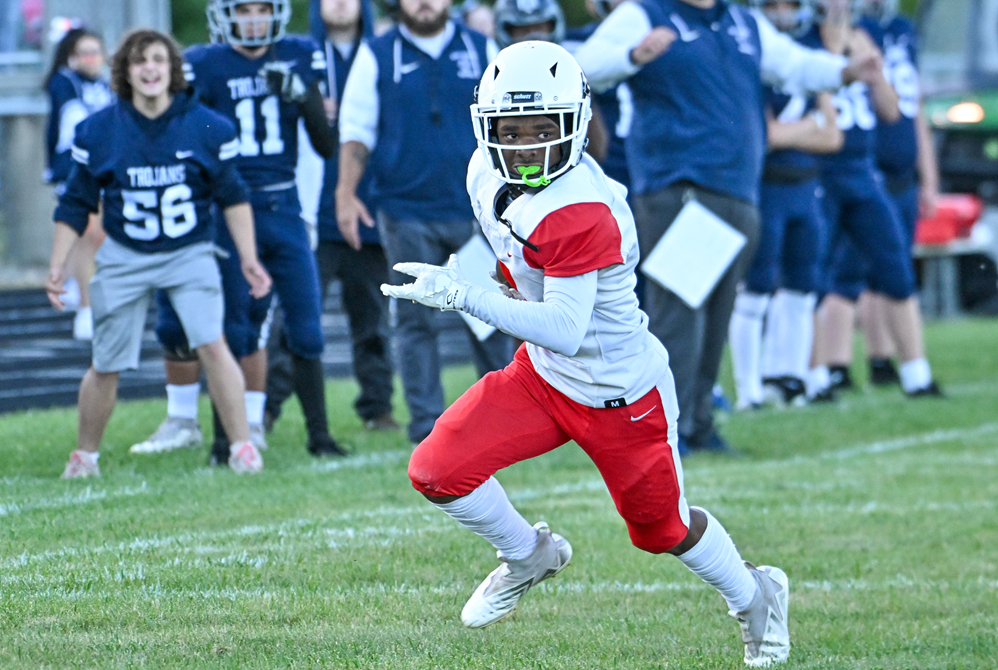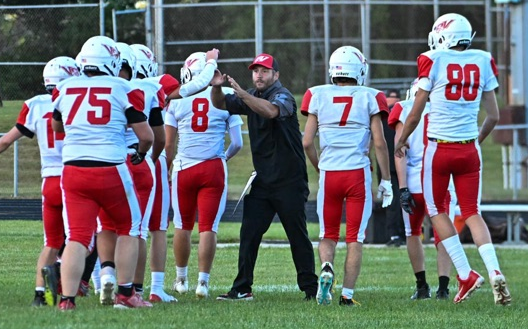
Playoff Proposal Pauses
May 10, 2013
During the MHSAA Football Finals at Ford Field last November, I was approached by representatives of the Michigan High School Football Coaches Association with a request to have the MHSAA’s computing capabilities crunch the numbers for a concept that a couple of the coaches association’s members had for revising the MHSAA Football Playoff point system.
Within a few weeks the MHSAA hosted a meeting that brought together the coaches who introduced the concept with our numbers crunchers; and within a few days our staff had outlined the principles, revised the point system and retrofitted it to show how the system would have affected the 2012 playoffs.
There was initial excitement that we might be onto something, but that brief infatuation began to wane as we dug deeper and discussed the plan more widely.
The key ingredients of the proposal are (1) that a school would gain playoff points for every game its opponent wins, whether or not that school defeated that opponent, and (2) that the number of automatic qualifiers would be reduced in favor of a larger group of additional qualifiers based on a revised playoff points system that would favor schools which schedule larger and more successful opponents.
In spite of our staff’s helpfulness in bringing this proposal forward, we’ve lost optimism that it will accomplish what is hoped. Rather than making regular-season scheduling easier, it could make it harder as the “six-wins-and-in” mindset is replaced by the even worse “seven-wins-and-in” mindset. And any system that ignores a minimum number of wins and relies entirely on playoff points is even less fair than the current system to schools in the less densely populated areas of Michigan.
From our retrofitting of the proposed concept to the 2012 season, we know that teams with 6-3 records would be displaced in the playoffs by teams with 4-5 records, which is certain to go down badly and be difficult to explain to those communities. The revised point system would make it even more difficult than the current system for schools in less populated areas to find opponents of the size and strength to generate high playoff point averages without these schools driving 100, 200, 300 or more miles, one way, several times each season. For individual schools and some entire leagues, this will make football scheduling tougher, not easier. It is likely to add stress to those league affiliations, and to football scheduling generally.
In any event, there is no need to rush to 2013 or 2014 a proposal that’s called “Enhanced Strength of Schedule System” because schedules are 99 percent set for 2013 and nearly so for 2014. Even if adopted today, few schedules would be impacted before 2015. If a change like this one is to be implemented, schools must have ample notice, and our technology department must have enough time to program the new point system and then test it through an entire season.
The Representative Council acted wisely on May 6 when it paused the progress of this proposal. Some elements of it may be discussed at the MHSAA’s scheduled meetings this summer and fall.

Vandercook Lake Football Returns, Growing Despite School's Decreased Enrollment
By
Doug Donnelly
Special for MHSAA.com
September 17, 2024
A few weeks ago, Daniel Midena noticed someone watching his Vandercook Lake football team practice in Jackson.
 Upon some quick investigation, he discovered it was a friendly visit.
Upon some quick investigation, he discovered it was a friendly visit.
“I found out it was one of our alumni,” Midena said. “Turns out he just wanted to congratulate our guys on that win. I told our kids, if we do this right, the community is going to support you.”
The Jayhawks had defeated East Jackson 43-28 on Sept. 6 to win their first 11-player varsity football game since 2018.
“I’m just so proud of the kids,” he said. “They put in a lot of hard work. To just experience that win and to know, ‘Yeah, we can do this.’ That was great for the kids. This is what winning feels like. So many people reached out with congratulations – some people that I don’t even know.”
The last winning season for Vandercook Lake was in 2015. It’s been a rocky road since for the football program, which has struggled to field full varsity teams and win games for the last decade. The Jayhawks moved to 8-player football in 2020 in an effort to save the program, but by 2022 the team was down to 10 players or fewer at times. They lost games that fall by scores of 79-0, 58-0, 65-0 and 70-0 before halting the season.
Midena, 32, a physical education and health teacher at Vandercook Lake, has been the architect of the rebuild. A Brooklyn Columbia Central graduate, Midena took over the Vandercook Lake Middle School football program a couple of years ago and saw some success. One of his teams went undefeated.
Once he entered the picture, the team more than doubled its turnout for football, from 11 players in 2022 to 30 players last season. This year he has nearly 40 athletes participating on the varsity and JV.
“We were at rock bottom,” he said. “I said, ‘Let’s see if we can change this. I was able to reach some of the kids in the hallways. We were able to double the numbers. There were a lot of kids who should have been playing. They just expected to lose here and didn’t want to play. I am trying to change that – to get an expect-to-win mentality.”
He’s also teaching the game to some athletes who never had the opportunity to play youth football or learn the game growing up.
“Still today, I’m teaching things I wouldn’t think I would have to,” he said. “From not playing football, some of these just need to be taught the simple rules. Every day we teach the game more than we play it. They must know the game before they can do it. That was a big thing. We’re literally teaching basic rules and schemes.”
 Midena has no trouble teaching the rules of the game. He’s officiated basketball, baseball and football for the MHSAA for several years. Last year he was one of the officials for the 11-player Division 4 Final at Ford Field.
Midena has no trouble teaching the rules of the game. He’s officiated basketball, baseball and football for the MHSAA for several years. Last year he was one of the officials for the 11-player Division 4 Final at Ford Field.
“I think that helps big-time with the rule knowledge and teaching the kids,” he said of his referee background.
Most of all, he’s building relationships with a new era of football players at the Jackson County school. When he was asked to take over the program once the school decided to return to 11-player football, he decided to take off his referee hat and pick the coaching whistle. Having coached several of the current varsity players while they were in middle school was an advantage.
“I feel we have done a tremendous amount of growth from last year to this year,” he said. “I had relationships with them; they knew my expectations.
He is now looking to build consistency in the program.
“Most challenging is consistency,” Midena said. “That is our big word. I still fight numbers every day. Monday, we finished the JV game with 11 players, and we won. That is still a problem. The kids have to learn that you have to show up every day for practice. It’s the process over the outcome. You can’t just show up and think we are going to do okay on Friday.
“We’re still trying to drive home to the kids you have to be consistent in everything you do.”
The Jayhawks are focused on building a foundation for football teams of the future. The current team has two seniors, six juniors and more than 30 freshmen and sophomores.
While he hopes there are more wins on this year’s schedule, he is not taking anything for granted.
“We take things on a game-by-game basis,” he said. “Our goal is to go out and compete and see how we are going to do.”
Some players are pulling double duty, participating in cross country or marching band this fall.
“They run in, I give them some details, and they go out and perform in the band. We share athletes in other sports,” he said.
The Vandercook Lake school district is going through a steady decline in enrollment, something Midena says keeps him up at night. In 2008, the high school enrollment was two students shy of 400. This fall, the enrollment is 190.
“I have to keep reaching the kids that we have here,” he said. “I can only concentrate on the kids we have here at the school. That’s what I am going to continue to do – try to get more kids to come out and play football.”
 Doug Donnelly has served as a sports and news reporter and city editor over 25 years, writing for the Daily Chief-Union in Upper Sandusky, Ohio from 1992-1995, the Monroe Evening News from 1995-2012 and the Adrian Daily Telegram since 2013. He's also written a book on high school basketball in Monroe County and compiles record books for various schools in southeast Michigan. E-mail him at [email protected] with story ideas for Jackson, Washtenaw, Hillsdale, Lenawee and Monroe counties.
Doug Donnelly has served as a sports and news reporter and city editor over 25 years, writing for the Daily Chief-Union in Upper Sandusky, Ohio from 1992-1995, the Monroe Evening News from 1995-2012 and the Adrian Daily Telegram since 2013. He's also written a book on high school basketball in Monroe County and compiles record books for various schools in southeast Michigan. E-mail him at [email protected] with story ideas for Jackson, Washtenaw, Hillsdale, Lenawee and Monroe counties.
PHOTOS (Top) Vandercook Lake’s Leland Barton carries the ball against East Jackson this season. (Middle) Jayhawks coach Daniel Midena, middle, high-fives his players. (Photos by Jeff Steers.)

